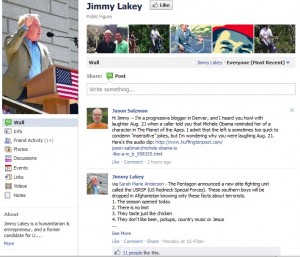Caplis and Silverman rush Gessler off the air after he alleges election fraud in Denver
Friday, September 30th, 2011Under normal circumstances, I’d slam KHOW’s Caplis and Silverman for letting Colorado’s Secretary of State breeze onto their show Wednesday, assert that there’s a “pretty high incidence of fraud” among one type of Denver voters, and then depart without being forced to explain what in the world he was talking about and what evidence he had to back it up.
But maybe Caplis and Silverman have heard Secretary of State Scott Gessler make so many unsubstantiated accusations of election fraud by now that it sounds normal, so normal that they think there’s no need for boring follow-up questions.
Whatever they were thinking, KHOW talk-show hosts Dan Caplis and Craig Silverman listened in silence Wednesday as Scott Gessler made the startling assertion that “Denver itself admitted” that sending election ballots to inactive voters has resulted in a “pretty high incidence of fraud.”
The issue arose last week when Gessler’s office sued to block Denver from mailing ballots for the Nov. 1 election to voters who haven’t cast a ballot since 2008 and did not respond to a letter asking if they wanted a ballot.
Gessler took the action partially to “reduce the potential for fraud,” according to the lawsuit.
But on the radio, Gessler sharpened his accusation, saying he was fighting fraud itself, not just theoretical fraud.
Gessler said [at the 37 minute point in the podcast]: But Denver itself admitted, there’s a pretty high incidence of fraud in inactive-voters returned ballots. They rejected in their municipal election well over 200. So we know fraud exists. The question is, what’s the extent and what’s the proper balance. The Legislature struck that balance. I’m going to respect it.
Denver has not admitted that there was any fraud resulting from ballots submitted by inactive voters, much less a “pretty high incidence” of it.
“I’m not sure what he [Gessler] is saying is fraud,” Denver Clerk and Recorder Debra Johnson told me. “He’s using the word fraud loosely.”
She said about 200 ballots in the 2011 Denver municipal election were found to have “signature discrepancies,” meaning the voter’s signature on the paper ballot was determined not to match the voter’s signature in Denver’s database. If a signature discrepancy is found, a voter is sent a letter and given eight days to clear up the matter.
“Every one of those is sent to the District Attorney,” Johnson told me. “And none of those has been identified as fraudulent by the DA.”
Johnson pointed out that it’s not just the inactive voters who have signature discrepancies, it’s also the active voters. ‘We pulled our numbers from the last election, and they were the same, in terms of the percentage of ballots returned,” she said.
The history of election fraud in Denver, it turns out, is deadly dull, even to a political junkie. And you’d have to think even Gessler, who seems to get excited about fraud even when it’s not really fraud, would find it dull as well.
The last case of election fraud in Denver that was actually prosecuted occurred in 2005 and involved a single voter, according to Amber McReynolds, Director of Elections for Denver. She added that, in 2009, a circulator of a petition was found to be fraudulently signing names, and turned over to the DA, and in 2010, the state of Arizona asked Denver for information about a person who voted in Denver and also attempted to vote in Arizona.
Gessler’s interview on Caplis and Silverman stands in stark contrast to comments he made Aug. 31, 2010, on KFKA’s Amy Oliver Show.
At the time candidate Gessler was attacking then Colorado Secretary of State Bernie Buesher for allegedly failing to ensure that Colorado complied with a federal law requiring overseas military personnel be sent election ballots 45 days before the 2010 election. In the end, Buescher found a way for Colorado to comply.
Radio-host Oliver laughed it up with Gessler, who said something that Caplis and Silverman should play back to Gessler next time he’s on their show:
Gessler said: “You’re the Secretary of State. What the heck is your job? Your job is to make sure people can vote. That’s one of your jobs!”
On Caplis and Silverman Wed., about a year after his appearance on KFKA, Gessler hadn’t completely forgotten this notion of trying to make sure people can vote.
Asked by Caplis what he thought Denver was trying to accomplish by sending ballots to inactive voters, Gessler said, “I’m guessing they are trying to increase the number of people who vote in the turnout from inactive voters.”
Silverman then asked Gessler why it “isn’t a good thing, if more people vote.”
“It’s good if you don’t have fraud,” he replied.
And since there apparently is no fraud, where does that leave Gessler?
I’m hoping Caplis will ask him next time he’s on the show. Letting him depart with a”keep-up-the-good-work” slap on the back is pretty hard to listen to.


